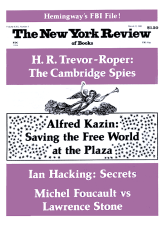In response to:
Nuclear Sense and Nonsense from the December 16, 1982 issue
To the Editors:
Lord Zuckerman’s essay, “Nuclear Sense and Nonsense” [NYR, December 16] contains a few critical remarks about me to which I would like to respond.
Contrary to Lord Zuckerman’s assertion, Mr. Robert Scheer, the author of With Enough Shovels, cannot have “tapes of conversations” with me because I have never talked to him. To the best of my knowledge, I have never met him. In fact, I do not even know who he is apart from being the author of what (judging by Lord Zuckerman’s review) is an ill-informed and nasty book.
“Given a civil-defense policy like that of the Russians,” Lord Zuckerman writes, “fatal Soviet casualties might be kept down to the level of, say, twenty million which, Professor Pipes thinks, is a tolerable figure.” Twenty million casualties is the number suffered by the Soviet Union in World War II: since among these victims were members of my own family, I can hardly regard such figures with equanimity. I may further add that estimates by Soviet Civil Defence authorities suggest that they (not I) believe a well-developed and executed civil defence program will keep casualties in a nuclear conflict down to that level. If Lord Zuckerman regards such expectations as nonsense then he may wish to communicate his views to General Altunin who heads the Soviet Civil Defence effort rather than criticize American rapporteurs of Altunin’s estimates.
Quoting Mr. Scheer, Lord Zuckerman describes me as a “‘notorious anti-Soviet hard liner’ who came to America from Poland.” If Lord Zuckerman will define for me a “notorious pro-Soviet soft liner” I will be able to tell whether I am indeed his opposite. My coming to America from Poland, however, has no more bearing on my intellectual qualifications than Lord Zuckerman’s migration from South Africa to England has on his.
Lord Zuckerman admits to knowing little about me but he is “clear that Pipes has little or no idea what it’s like when a city is devastated even with conventional bombs.” Whence the certainty? It so happens that I resided in Warsaw in September 1939 when the city was devastated in Nazi terror raids. The experience has etched itself deeply in my memory, though I fail to see why it should make me more competent to discuss Soviet nuclear strategy. Most knowledge which civilized man has at his disposal he acquires vicariously, learning from the experience of others. Were this not so, were we required to undergo personally all that we profess to know, on what authority would Lord Zuckerman himself [have] dared to publish fifty years ago his pioneering Social Life of Monkeys and Apes since he clearly is neither a monkey nor an ape?
Lord Zuckerman expresses dismay that the school of thought with which I am associated “prospers” while that which he regards as having a monopoly on political wisdom “has failed to influence policy.” To the extent that his essay is representative of his favored school, the reason is not far to seek. Carelessness with facts, frequent resort to ad hominem arguments and to ridicule are symptomatic of contempt for the opinions of others. Such a method of argumentation gets one so far but no further. It may sway some readers, but it certainly does not impress those who must make fundamental decisions affecting national security.
Richard Pipes
Harvard University
Cambridge, Massachusetts
Lord Zuckerman replies:
I fear that Dr. Pipes protests too much. My reference to “transcripts of tapes and of other records” related generally to those which Mr. Scheer reproduced in his book.
The references to Dr. Pipes’s beliefs are in the form of excerpts from his writings. If they are false, I suggest that he take the matter up with Mr. Scheer. If they are not, those who like myself regard the views which they expressed as nonsensical will learn with relief that Dr. Pipes now wishes either to qualify or to disown them.
This Issue
March 31, 1983



